#mai tsuzuki
Explore tagged Tumblr posts
Text

Ai Yazawa x Lulu Felice.
#ai yazawa#gokinjo monogatari#nana#nana komatsu#nana osaki#lulu felice#lulu felice x ai yazawa#ai yazawa fashion#mai tsuzuki#misato uehara
414 notes
·
View notes
Text




i need this beauty to collect dust on my shelf
#nana#nana anime#nana komatsu#nana osaki#nobuo terashima#shinichi okazaki#yasushi takagi#black stones#trapnest#ren honjo#reira serizawa#takumi ichinose#naoki fujieda#shouji endou#ps2 games#ps2#2000s#shoujo#shoujo beat#nana manga#mai tsuzuki
131 notes
·
View notes
Text





౨ৎ 𝅄 💮 𔔀 𓋜𝑀



#꒰ atsubie ꒱ ౨ৎ︵⠀⠀#ㅤ⋆ㅤㅤㅤ݄ㅤ atsu nana 300 special#ㅤ ㅤ ㅤ ㅤ ㅤ ㅤ ㅤ ㅤ ㅤ ㅤ ㅤ ㅤ ㅤ ㅤ ㅤ ㅤ ㅤ ㅤ ㅤ ㅤ ㅤ ㅤ ㅤ ㅤ ㅤ ㅤ ㅤ ㅤ ㅤ ㅤ ㅤ ㅤ ㅤ ㅤ ㅤ ㅤ ㅤ ㅤ ㅤ ㅤ ㅤ ㅤ ㅤ ㅤ ㅤ ㅤ ㅤ ㅤ ㅤ ㅤ ㅤ ㅤ ㅤ ㅤ ㅤ ㅤ ㅤ ㅤ ㅤ ㅤ ㅤ ㅤ#vivi moodboard#vivi loossemble#vivi loona#kpop icons#kpop layouts#messy moodboard#kpop moodboard#kpop themes#kpop aesthetic#alternative moodboard#colorful moodboard#red moodboard#nana moodboard#misato uehara#mai tsuzuki#anime moodboard#lolita moodboard#soft moodboard#ai yazawa
136 notes
·
View notes
Text

#ai yazawa#yazawa ai#NANA#mai tsuzuki#misato uehara#nana komatsu#hachi#hachiko#anime#manga#parakindo
117 notes
·
View notes
Text
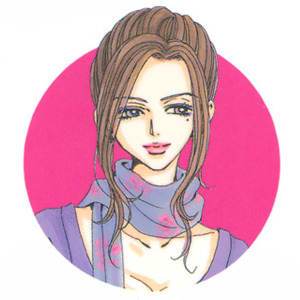
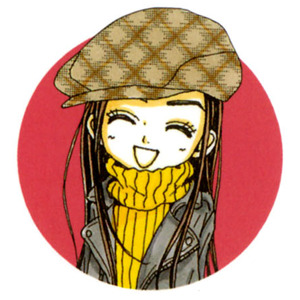

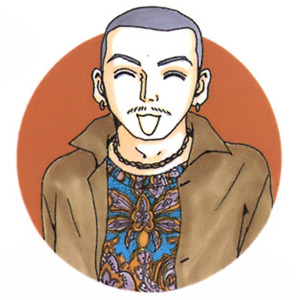

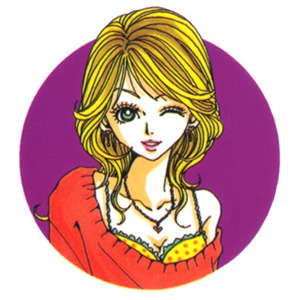



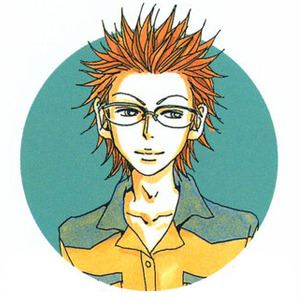
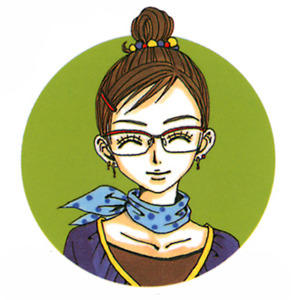
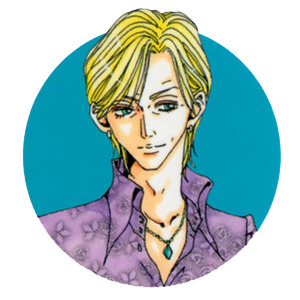
Nana (2000) by Ai Yazawa
character icons 2/2
#nana#nana manga#ai yazawa#shion#satsuki ichinose#misato uehara#mai tsuzuki#ginpei#miu shinoda#yuri kosaka#sachiko kawamura#shoji endo#kawano#kinoshita#mari#narita
120 notes
·
View notes
Text









⋆ ˚。⋆୨୧˚ Misato Uehara fashion 2 ⋆ ˚。⋆୨୧˚
#misato uehara#misato uehara clothes#misato uehara outfits#misato uehara fashion#anime fashion#animefashion#anime clothes#anime outfits#nana#fashion#outfits#clothes#nana fashion#mai tsuzuki#jfashion#japanese fashion#harajuku
15 notes
·
View notes
Photo

96 notes
·
View notes
Text

me when I’m one of the most cute characters in nana
4 notes
·
View notes
Text



Informes de Misato
30 preguntas a Ai Yazawa
Nana 7.8 (2003)
#ai yazawa#nana#ai yazawa manga#ai yazawa nana#nana anime#nana manga#nana osaki#nana komatsu#misato uehara#mai tsuzuki#anime#manga#shojo#josei#black stones#trapnest
38 notes
·
View notes
Text

I love mai sutsuki 😍😍💕💕
2 notes
·
View notes
Text





舞いあがれ! (2022) Episode 38 Subtitles by fimo
#i cant believe she managed to drag his ass to the party by using tsuzuki points 😭😭😭#meguro ren#目黒蓮#fukuhara haruka#福原遥#mai agare!#mai agare#舞いあがれ!#asadora#朝ドラ#asadoraedit#jdrama
13 notes
·
View notes
Text
God I love animation. I love it for the way it can bring anything to life beyond the constraints of boring ol' reality, but also the ways that it's inextricably linked to, and draws on the conventions of live-action film-making.
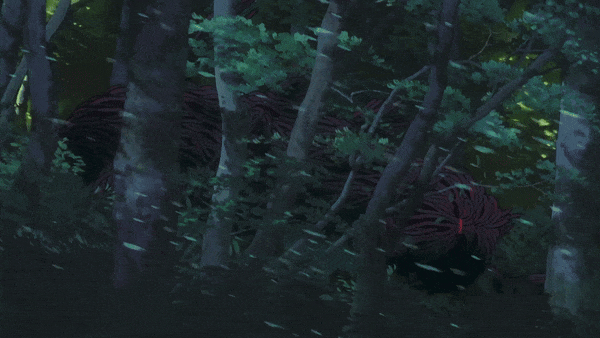
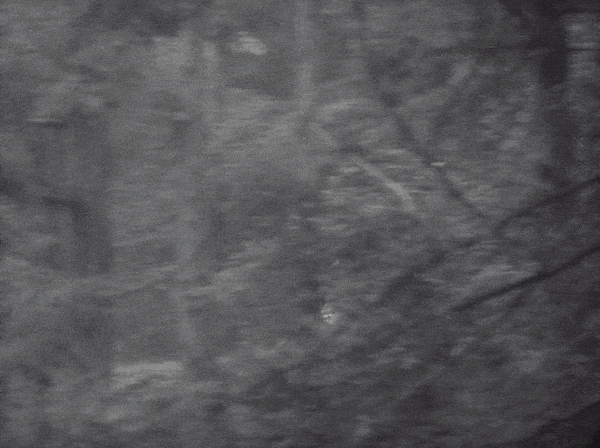
So fuck it, let's look at how Hayao Miyazaki straight up copies some camera framing techniques from his predecessor and the other most influential Japanese filmmaker of all time, Akira Kurosawa! (Kurosawa really was the master of framing scenes around his characters, so he's a great source of inspiration)
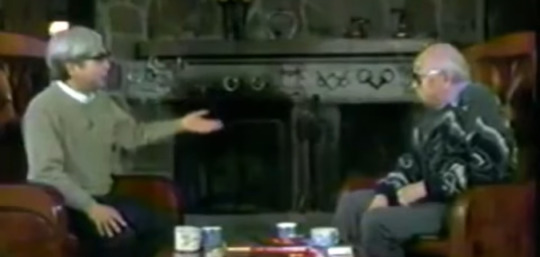
(btw, this is a screenshot from this TV special where the two met for the first time just after the release of Kurosawa's final film. It's pretty interesting, and also very cute how nervous Miyazaki seems to be to meet one of his idols.)
Specifically, how the two each choose to break the 180 degree rule (well, not technically 'break' in the case of Kurosawa) to show their protagonists' changing destiny in "Throne of Blood" and "Princess Mononoke".
For anyone who doesn't know, the 180 degree rule is a basic film-making rule of thumb which states that in any scene where two characters interact, you should draw an imaginary line between them and the camera should always stay on one side of that line.

("In the Mood for Love" - Wong Kar-wai)
This way, one character is always looking to the right of the camera, the other is always looking to the left, and the audience doesn't get confused by the geography of the scene. Crossing this line can be disorienting, but when done intentionally, it can convey a paradigm shift of some kind in the scene.
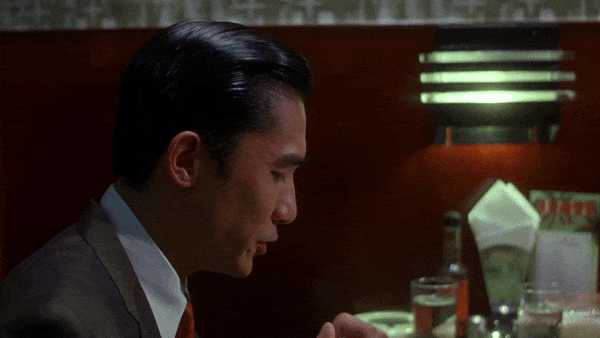
In this scene from "Throne of Blood," (a feudal Japanese retelling of Macbeth) Washizu's wife Asaji discusses tactics with him and tries to convince him to aspire to the throne and to assassinate his lord Tsuzuki while he sleeps.
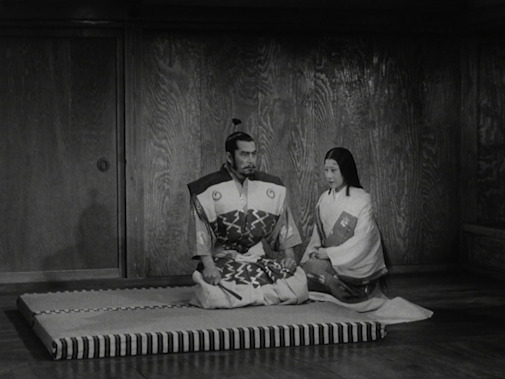
As two servants appear to notify them that Washizu's sleeping quarters are prepared, the camera dollies left and around the characters' backs. This camera movement is motivated by the motion of the servants' torches outside the room, but it also signifies a change in Washizu's outlook.
Washizu is completely silent for most of this scene, contemplating his wife's advice. But as the camera slides behind his back and across the line of action, the scene is now re-framed, illustrating his change in perspective.
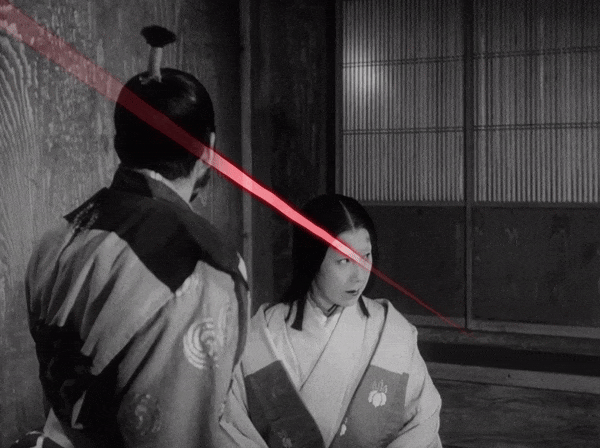
He's been convinced and the trajectory of his life is about to change - and now, facing away from the camera, is the time for action.
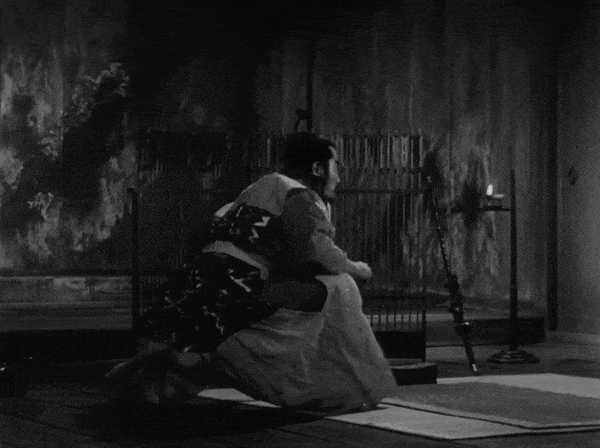
Because the camera slides smoothly across the line, Kurosawa isn't technically breaking the 180 degree rule. Miyazaki on the other hand, takes it a little further.
The complimentary scene in Princess Mononoke comes near the start when the wise woman of the village reads Prince Ashitaka's fortune after he's cursed by the wild boar spirit. She tells him that it is his fate to leave the village and travel to the west, where he may be able to lift the curse on his arm. The trajectory of Ashitaka's life changes in this moment too. As he accepts his fate, the change is symbolized by him cutting off his hair, but also by the camera jumping the line.
Throughout this dialogue scene and even as he cuts his hair, the simulated camera sits just slightly to the side of Ashitaka's left shoulder.
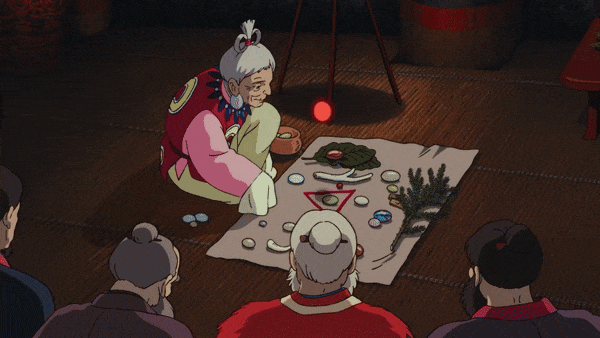
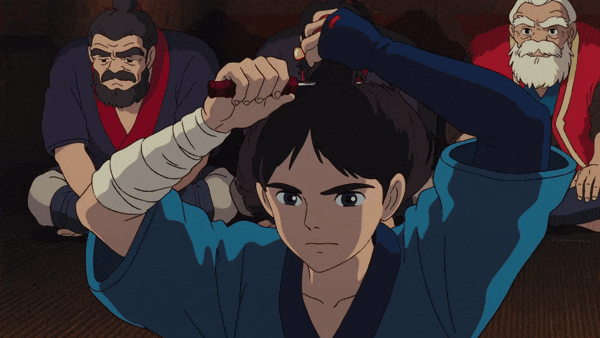
But once it's done, for the final shot, the scene is reframed and we jump to the other side, where Ashitaka is now looking to the right of the camera instead of the left.
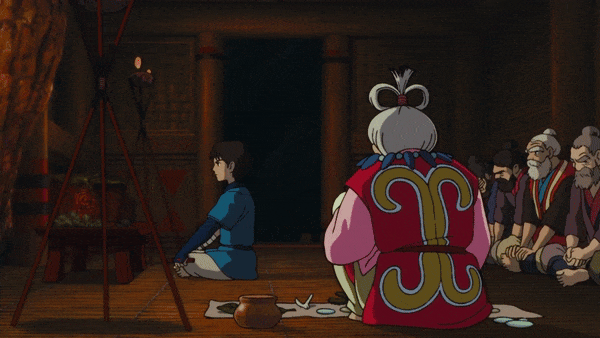
Making the camera dolly across a scene like Kurosawa's version in 2D animation is no simple task, so this transition with a simple cut is in a way subtler, in another way a bit more jarring, but it conveys the same meaning.
This is the moment when our protagonists make the choice to embark on a new destiny and re-frame their lives.
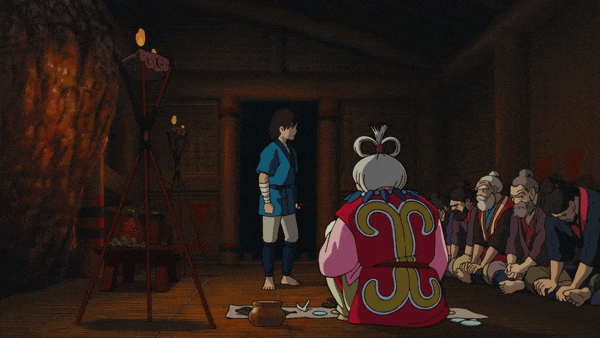
This has been an excerpt from a short video essay I made a while back, which not many people watched. I think this is at least in part due to my failure to package it well, and it seems you tumblheads like this animation/cinematography analysis stuff, so this is an experiment to see if, with the help of y'all, and a new title and thumbnail, it's at all possible to give this video a second wind in the eyes of the Youtube Gods!
So if you found this interesting, I'd appreciate if you checked it out! Thanks for reading!
youtube
#Also i spent a lot of time on the little animated bit at the start so please watch it lol#animation analysis#mini essay#video#video essay#princess mononoke#throne of blood#hayao miyazaki#akira kurosawa#Youtube#gif warning
1K notes
·
View notes
Text
[2024.05.11] Quardruple Axel May Issue: Shoichiro Tsuzuki’s Words
Shoichiro Tsuzuki who watched RE_PRAY in Yokohama. Written by: Naoko Utsunomiya

His seat was at the front on the ground floor. There were many spectators from China around the seats.
"Then, one after another, they came to me and asked me, "Can I ask you to sign your name?", "Can I take a photo with you?" Well, I was also surprised. I must have written "Tsuzuki Shoichiro" more than 200 times that day just before the ice show started and during intermission. I think everyone originally wanted Hanyu’s autograph. But after all, there was no such opportunity, so they came to me. It’s inevitable.”
Tsuzuki laughed and spoke. Then he started gushing about Yuzuru Hanyu as usual.
During the conversation that day, he referred to Hanyu as "god." Also calls him "Universe". At times like this, Tsuzuki always looked proud.
"Hanyu is really full of fighting spirit. His movements are no different from those currently competing".
Tsuzuki’s overall impression of RE_PRAY is this.
"In terms of the overall composition, I think Hanyu was thinking "Let’s do it!" and wanted to present everything during this period of time (during the performance). This is the same side as when he was competing, a side that challenges the new world. I think he probably wanted to show everyone that "it's possible to do figure skating like this without being bound by the rules." His figure skating is really amazing. Not a note off at all. It can be said that he is expressing the notes one by one. 1, 2, 3, 4, all the notes are represented. Hanyu is truly a professional. I think he himself also wants everyone to see 'This is what Pro is like'."
I (note: columnist Naoko Utsunomiya) watched RE_PRAY at the movie theatre. What Hanyu does is figure skating that makes people feel his soul. Or should I say, it is figure skating that cuts off all escape routes. I think I got a glimpse of his way of survival.
"He must have gone through a lot of practice. Otherwise, he wouldn’t be able to do such moves. After all, it’s such (high-level) skating and technique. The same goes for jumping. Even when jumping in a very intense performance, there were almost no mistakes. Although the current athletes are also performing difficult elements, from a performance perspective, I think Hanyu is better. That kind of performance is what Hanyu has mastered since he became a professional skater, and it has become a brand-new weapon for him. Moreover, he has to skate for 2 hours straight, which requires a lot of physical strength. I can only marvel at that. Looking around the world, no skater can do what he does. Even skaters who have achieved great results in the past will have a decline in their level after retirement. Hanyu would not allow this. He always gives people the best performance. Therefore, he also has to make a thorough effort. There is no room for error. When I watched the ice performance live this time, I thought, "Oh, it turns out that he can already do such a thing," and tears welled up."
In Yokohama, Hanyu mentioned in his speech, "Thank you everyone for your support." My power is so small." Tsuzuki commented on this.
"I think it’s because he feels a sense of unity between all the viewers and himself. There was a feeling of spiritual connection between the audience and the performers in the venue. It is not often possible to create such an atmosphere during ice performances. I felt something beyond the soul. Hanyu, he has become a god. I feel like the god of figure skating is performing".
Not a king, but a God. Tsuzuki looked full of pride. I also interjected from time to time: "Yes, it is true."
Yuzuru Hanyu’s figure skating can be said to be a blessing for viewers. And this is especially true after he left competitions. I think the audience has also broken away from the rules and become freer.
Regarding Hanyu’s statement, “I have no confidence in myself,” I asked Tsuzuki what he thought.
"How to put it, I think what lies behind "lack of self-confidence" is actually the idea of "I could have done more", which is a confrontation with himself. I think it is precisely because he is so unwilling to admit defeat that he would say this. No matter in the past or now, he is working very hard to cultivate himself. Then, he will continue to challenge the future from now on. In what way will he create? Really looking forward to it. Hanyu now interacts with people from various fields. Ultimately, I think this is because many people are surprised by Hanyu as a person, impressed by him, and also have expectations for him. Hanyu has the ability to make top people think, "I want to try this next time." Because of this, there are people who continue to provide him with various opportunities to challenge. People who feel Hanyu's charm naturally gather around him. Isn't that what he is like now?"
During the interview, Tsuzuki always smiled. He couldn't help but raised his voice several times and laughed out loud.
"So, Yuzuru Hanyu has become a person who can become a god in figure skating. He has gone far beyond my imagination. It’s already infinite. It’s the universe. The world of the universe", Tsuzuki said.
Yuzuru Hanyu has the power to make people happy. He probably knows this himself. Because of this, he always "pours his soul into skating." I think so. I wish him the best of luck.
Source: Quadruple Axel 2024 #羽生結弦 SPECIAL pg 92 Info: https://x.com/AxelQuadruple/status/1790029567777763837
22 notes
·
View notes
Text

Tsudzuku … Tsu Dzu Ku …. HIRAGANA e significa appunto continua. La parola “Tsudzuku” (続く), che appare spesso alla fine degli episodi dei cartoni animati giapponesi, ha un significato semplice ma profondo: “continuare” o “proseguire”. Questa parola, composta dal kanji 続 (tsuzu), che rappresenta il concetto di continuità o collegamento, e く (ku), la forma grammaticale che ne completa la funzione verbale, incarna un’idea chiave nella filosofia giapponese: il fluire continuo della vita e delle esperienze.
Nei cartoni animati, “tsudzuku” segnala che la storia non è finita, ma proseguirà nel prossimo episodio, creando un senso di attesa e di legame con il futuro. La cultura giapponese attribuisce grande valore alla continuità, al fatto che ogni evento è connesso a ciò che lo precede e a ciò che lo segue. Questo principio si riflette non solo nelle narrazioni animate, ma anche nella vita quotidiana e nel pensiero filosofico giapponese. La pazienza, l’accettazione del cambiamento graduale e l’importanza del processo rispetto al risultato finale sono tutti concetti che ruotano attorno a questa nozione di continuità.
Anche a livello lessicale, “tsudzuku” si collega a molte altre parole giapponesi che enfatizzano il senso di durata e connessione. Per esempio, “tsuzukeru” (続ける) significa “continuare qualcosa attivamente”, mentre “tsuzuki” (続き) indica una “continuazione”, una parte successiva di una storia o di un discorso. Questo riflette il modo in cui la lingua giapponese è costruita per riconoscere e onorare il ciclo della vita, del lavoro e della narrazione.
“Tsudzuku” ci ricorda che ogni fine non è mai davvero una fine, ma solo una pausa nel cammino.
10 notes
·
View notes
Text

30 notes
·
View notes
Text
Stay Safe
English Translation:
Just by seeing you in front of me
My tears are overflowing
I wonder why that is?
Maybe it’s because you’ve grown up
If tomorrow is something
That can only be decided tomorrow
Then I want to hold you
Now while I still can
If only we could be together forever
If only we could laugh together forever
I want to protect you
That’s all I want
But everyday, it’s not that simple
So for today, all I can do is pray
Though I don’t even know if it’ll reach you
May there always be light in your sky
Please stay safe
If you continue to walk
You’ll be able to meet someone
So please don’t let
Your story end by your own hand
Cry, even when times are hard
Cry, cry, cry
It’s okay to cry
I want to protect you
That’s all I want
But everyday, it’s not that simple
So for today, all I can do is pray
Though I don’t even know if it’ll reach you
May there always be light in your sky
Please stay safe
You are my sunshine
As much as I can
As much as I can
As much as I can
I want to hold you
I want to protect you
That’s all I want
But everyday, it’s not that simple
So for today, all I can do is pray
Though I don’t even know if it’ll reach you
May there always be light in your sky
Please stay safe
Romaji Lyrics:
me no mae no kimi ga
utsuru dake de namida ga
afureru kore wa naze
toshitotta no kana
ashita no koto wa
ashita ga kimeru no nara
ima no uchi ni anata wo
dakishimeteitai
zutto issho ni ireru no nara
zutto issho ni waraeru no nara
anata wo mamoritai
tada sore dake no koto na no ni
mainichi wa kantan ni sasete kurenai
dakara kyou inoru dake
todoiteru no ka wakaranai kedo
anata no sora ni itsumo hikari wo
Please stay safe
aruiteikeba
dareka to deau kara
anata no tsuzuki wo
jibun de owarasenaide
naite sore demo tsurai toki wa
naite naite naite
naki tsukarereba ii
anata wo mamoritai
tada sore dake no koto na no ni
mainichi wa kantan ni sasete kurenai
dakara kyou inoru dake
todoiteru no ka wakaranai kedo
anata no sora ni itsumo hikari wo
Please stay safe
anata wa boku no taiyou
nankai demo
nankai demo
nankai demo
dakishimetai
anata wo mamoritai
tada sore dake no koto na no ni
mainichi wa kantan ni sasete kurenai
dakara kyou inoru dake
todoiteru no ka wakaranai kedo
anata no sora ni itsumo hikari wo
Please stay safe
#see you there#kimura takuya#takuya kimura#木村拓哉#my translations#and that's a wrap!!#i really love this album and i think this is a perfect song to end it on!
8 notes
·
View notes